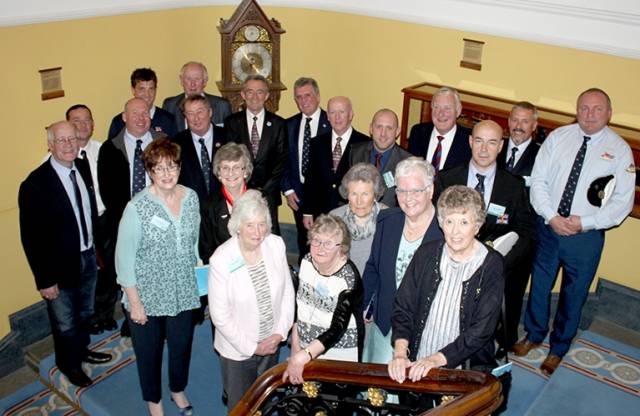RNLI volunteers have been honoured at the charity’s annual presentation of awards in Northern Ireland.
The event which was staged at the Belfast Harbour Commissioner’s Office on Friday night (21 October) honoured 21 awardees recognising their dedication and commitment to volunteering over long periods of time in a bid to raise funds and awareness and to help save lives at sea.
The ceremony was opened by Christopher Brooke, a member of the RNLI Council of Ireland. Mr Brooke welcomed the awardees and their families before introducing the guest speaker, outgoing RNLI Chairman Charles Hunter-Pease.
The awards included eight Gold Badges, four Bar to Gold badges, one supporter award, two Honorary Life Governorships and six long service awards.
The eight gold badge awards which recognise those who have dedicated many years to supporting the RNLI, were awarded to Sean Boyle and James Shovlin from The Rosses Branch in County Donegal, Rodney Byrne and Dorothy Weeks from the Portrush Lifeboat Management Group, Patrick Carter and Martin Reilly from the Sligo Bay Branch, Paddy McLaughlin from the Red Bay Branch in Cushendall and Lillian Stewart from the Larne Branch.
The Adelphi Hotel in Portrush was recognised with a supporter award.
There were four Bar to Gold badges, one of which was awarded posthumously to John Charleton from the Kilkeel Branch. Lynda Davidson from the Donaghadee Fundraising Branch, Margaret Nicholson from the Kilkeel Branch and Aileen Smyth from the Donaghadee Ladies’ Guild were also awarded.
The Honorary Life Governorship awards went to Eveleigh Brownlow from Portaferry and District Guild and Elenore Huston from the Coleraine/Castlerock Branch.
The long service awards in recognition of 20 years volunteering commitment went to Jeffrey Bell from Larne RNLI, Gregory McDaid from Lough Swilly RNLI, Raymond Newell from Kilkeel RNLI and Simon Rogers from Portaferry RNLI. Morrris McBride from Kilkeel RNLI and Shane McNamara from Donaghadee RNLI were recognised with a 30 year Bar to Long Service badge.
Speaking at the ceremony, Mr Hunter-Pease said there were a range of differing reasons why people volunteered for the RNLI: ‘There are the friendships forged through a common lifesaving aim. The thrill of seeing visitors enjoying your carefully planned events. The weight of a heavy bucket after a hard day’s collecting. And, yes many are motivated to volunteer for us by the pain of losing a loved one to the sea. They have converted that loss into a determination to make a difference to the lives of others.’
He said it was truly humbling to think of the collective years’ experience and care that was in the room: ‘To everyone one of you receiving an award – whether your service has been at sea or ashore – wear it with pride. It is the mark of someone very special, selflessly dedicated to the lives of others.’
Before presenting the awards, Mr Hunter-Pease said the RNLI had made an extraordinary difference to people’s lives in 2015. Volunteers from Northern Ireland’s nine lifeboat stations rescued 279 people and saved 11 lives. The lifeguards on 11 beaches on the Causeway Coast and in County Down rescued 11 people and saved one person’s life.































































